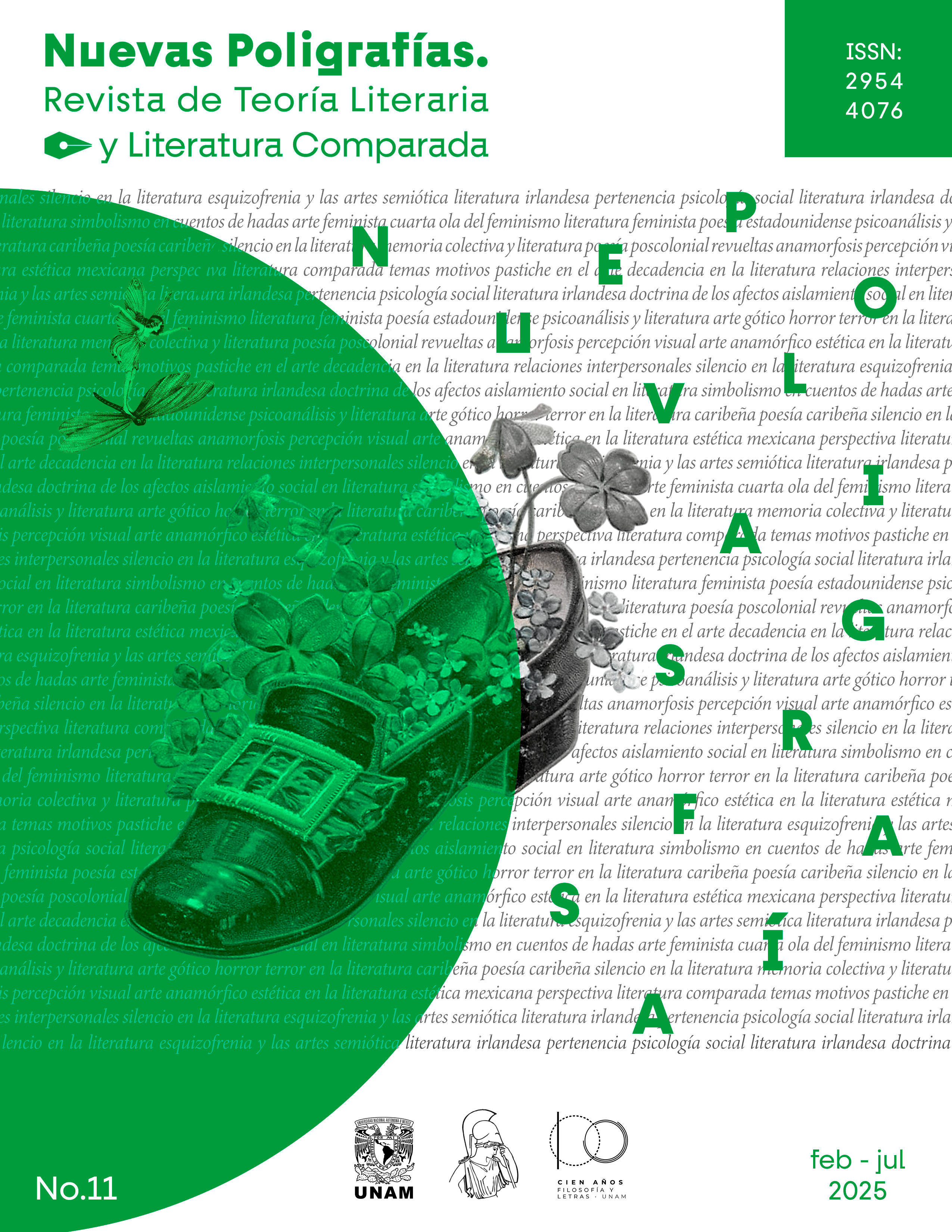The Importance of Being Normal: The Circulation of Affects in Sally Rooney’s Short Fiction
Main Article Content
Abstract
When defining the short story, Ireland’s alleged eminent prose form, Frank O’Connor surmised that its fictional worlds orbited toward the incapacity to accept a “normal society.” In other words, he deemed it a vehicle for abnormal characters. To continue the dialogue fostered by this canonical study, I propose that what lies underneath O’Connor’s observations is not a clear-cut differentiation between the two sides of the spectrum, but rather a quest for normalcy, which I pose as a quest for belonging. The first decade of the new millennium witnessed the collapse of the Celtic Tiger, whose neoliberal promise became the dominant public discourse. Its crash left citizens, mainly those belonging to the lower-middle and middle class, unguarded against the predatory capitalism that governs today’s world. Contemporary authors are registering the impact of larger, systemic failures in their fictions and confronting their mechanisms. An exemplary case is Sally Rooney, whose brutally precise prose details how the magnitude of ephemeral circumstances feels too overwhelming to understand and, thus, to articulate. Her characters struggle with the intimate implications of the global world we inhabit and navigate a profound sense of isolation as a result. Drawing on affect theory, in this article I analyze the characters’ processes of becoming aware of their affects and the fact that they are not yet ready to be translated into speech, what I term quotidian unease, in order to illuminate their quest for normalcy in Mr Salary and “At the Clinic.”
Article Details

This work is licensed under a Creative Commons Attribution-NonCommercial 4.0 International License.
References
ALFÉREZ MENDIA, Sofía. (2022). “Affective Relationships in the 21st Century: a Derridean Approach to Sally Rooney’s Normal People and Conversations with Friends”. Journal of the Association of Young Researchers of Anglophone Studies, 2, 33-51.
BRACKEN, Claire; HARNEY-MAHAJAN, Tara. (2017). “A Continuum of Irish Women’s Writing: Reflections on the Post-Celtic Tiger Era”. Lit: Literature Interpretation Theory, 28(2), 97-114. https://doi.org/10.1080/10436928.2017.1315547
CLARK, Alex. (2018, August 25). “Conversations with Sally Rooney: the 27-year-old novelist defining a generation”. The Guardian. https://www.theguardian.com/books/2018/aug/25/sally-rooney-interview-normal-people-conversations-with-friends
COLLINS, Lauren. (2018, December 31). “Sally Rooney Gets in Your Head”. The New Yorker. https://www.newyorker.com/magazine/2019/01/07/sally-rooney-gets-in-your-head
CORSETTI, Francesca. (2022, May 7). “Review: Beautiful World, Where Are You by Sally Rooney”. The Mistress of the House of Books. https://www.themistressofbooks.com/reviews/review-beautiful-world-where-are-you-by-sally-rooney
CRAIN, Caleb. (2021, September). “Sally Rooney Addresses Her Critics”. The Atlantic. https://www.theatlantic.com/magazine/archive/2021/09/sally-rooney-beautiful-world-where-are-you/619496/
D’HOKER, Elke. (2015). “Complicating the Irish Short Story”. In Elke D’Hoker and Stephanie Eggermont (Eds.), The Irish Short Story. Traditions and Trends (pp. 1-19). Peter Lang.
DONNELLY, Elisabeth. (2019, March 20). “This 28-Year-Old Irish Writer Really Captures Millennial Life”. Buzzfeed News. https://www.buzzfeednews.com/article/elisabethdonnelly/sally-rooney-conversations-with-friends-normal-people
ENRIGHT, Anne. (2011). “Introduction”. In Anne Enright (Ed.), The Granta Book of the Irish Short Story (pp. xiv-xvii). Granta.
ENRIGHT, Anne. (2021, September 2). “Beautiful World, Where Are You by Sally Rooney review – the problem of success”. The Guardian. https://www.theguardian.com/books/2021/sep/02/beautiful-world-where-are-you-by-sally-rooney-the
FISHER, Mark. (2009). “It’s easier to imagine the end of the world than the end of capitalism”. In Capitalist Realism: Is There No Alternative? (pp. 1-11). Zero Books.
FREEMAN, Ciaran. (2021, October 15). “Review: Sally Rooney writes for millennials in a post-Catholic world”. America. The Jesuit Review. https://www.americamagazine.org/arts-culture/2021/10/15/sally-rooney-beautiful-world-review-241658
GARNER, Dwight. (2019, April 8). “Sally Rooney’s ‘Normal People’ Explores Intense Love Across Social Classes”. The New York Times. https://www.nytimes.com/2019/04/08/books/review-normal-people-sally-rooney.html
HOGAN, Patrick Colm. (2016, August 31). “Affect Studies”. Oxford Research Encyclopedias. https://doi.org/10.1093/acrefore/9780190201098.013.105
HU, Jane. (2020, June 15). “Race and Romantic Realism”. Post45. https://post45.org/2020/06/race-and-romantic-realism/
INGMAN, Heather. (2009). “Introduction”. In A History of the Irish Short Story (pp. 1-14). Cambridge University Press.
KAVANAGH, Art. (2024, March 6). ‘“Oh my god, shut up.” Sally Rooney, short story writer.’ Art Kavanagh, Criticism, fiction and other writing. https://www.artkavanagh.ie/Sally-Rooney-short-stories.html
KENNEALLY, Michael. (2019). “Contemporary Irish Short Stories”. The Canadian Journal of Irish Studies, 42, 16-20.
MADOLE, Rob. (2024, December 15). “Eyes Like Cursors Blinking: On ‘Conversations with Friends’ and ‘Normal People’ by Sally Rooney”. Porter House Review. https://porterhousereview.org/articles/eyes-like-cursors-blinking-on-conversations-with-friends-and-normal-people-by-sally-rooney/
MORSE, Donald E. (2010). “‘The economics of utter idiocy’: The Rise and Demise of the Celtic Tiger”. Hungarian Journal of English and American Studies (HJEAS), 16(1/2), 243-256.
NOLAN, Michael. (2017, November 13). “Sally Rooney: ‘A large part of my style has definitely developed through writing emails’”. The Irish Times. https://www.irishtimes.com/culture/books/sally-rooney-a-large-part-of-my-style-has-definitely-developed-through-writing-emails-1.3289962
O’CONNOR, Frank. (2004 [1963]). “Author’s Introduction.” In The Lonely Voice (pp. 3-24). Melville House Publishing.
O’HANLON SJ, Gerry. (2019). “After the Pope the Catholic Church in Ireland”. Studies: An Irish Quarterly Review, 108(430), 126-137.
RAW, Ellen. (2023, December 17). “Why you should read ‘Mr Salary’ by Sally Rooney”. Mouse. https://nouse.co.uk/articles/2023/12/17/why-you-should-read-mr-salary-by-sally-rooney
ROONEY, Sally. (2017, August12). “‘Robbie Brady’s astonishing late goal takes its place in our personal histories’: A new short story by Sally Rooney”. The New Statesman. https://www.newstatesman.com/culture/2017/08/robbie-brady-s-astonishing-late-goal-takes-its-place-our-personal-histories
ROONEY, Sally. (2019 [2016]). Mr Salary. Faber & Faber.
ROONEY, Sally. (2020 [2016], May). “At the Clinic”. The White Review. https://www.thewhitereview.org/fiction/at-the-clinic/
SCHWARTZ, Alexandra. (2017, July 24). “A New Kind of Adultery Novel”. The New Yorker. https://www.newyorker.com/magazine/2017/07/31/a-new-kind-of-adultery-novel
SEIGWORTH, Gregory J. GREGG, Melissa. (2010). “An Inventory of Shimmers.” In Melissa Gregg and Gregory J. Seigworth (Eds.), The Affect Theory Reader (pp. 1-25). Duke University Press.
SHOUSE, Eric. (2005). “Feeling, Emotion, Affect”. M/C Journal,8(6). https://doi.org/10.5204/mcj.2443
SMALLWOOD, Christine. (2019, April 1). “Sally Rooney’s Great Expectations”. The New Republic. https://newrepublic.com/article/153233/sally-rooney-novel-normal-people-review
TAYLOR, Brandon. (2021, September 7). “Sally Rooney’s Novel of Letters Puts a Fresh Spin on Familiar Questions”. The New York Times. https://www.nytimes.com/2021/09/07/books/review/beautiful-world-where-are-you-sally-rooney.html https://www.nytimes.com/2021/09/07/books/review/beautiful-world-where-are-you-sally-rooney.html?unlocked_article_code=1.CE4.GOYs.bA0JXZjf4nFB
TEMPLE, Emily. (2019, April10). “Let’s All Stop Pigeonholing Sally Rooney as a ‘Millennial Writer’”. Literary Hub. https://lithub.com/lets-all-stop-pigeonholing-sally-rooney-as-a-millennial-writer/
TOWNSEND, Sarah L. (2011). “Cosmopolitanism and Home: Ireland’s Playboys from Celtic Revival to Celtic Tiger”. Journal of Modern Literature, 34(2), 45-64.
TU, Jessie. (2021, August 21). “Surely there are better literary heroes for our generation than Sally Rooney?”. The Sunday Morning Herald. https://www.smh.com.au/culture/tv-and-radio/surely-there-are-better-literary-heroes-for-our-generation-than-sally-rooney-20210817-p58jfp.html
WHITE, Hilary A. (2017, May 27). “‘I hate Yeats... how has he become this emblem of literary Irishness?’”. Irish Independent. https://www.independent.ie/entertainment/books/i-hate-yeatshow-has-he-become-this-emblem-of-literary-irishness/35757310.html
WILLIAMS, Jeffrey J. (2022). “Millennial Fiction Meets the Campus Novel.” American Book Review, 43(4), 14-17. https://dx.doi.org/10.1353/abr.2022.0127

